
by Gideon Marcus
World(Con) Affairs
I've heard a rumor that Galactic Journey will be up for Best Fanzine at this year's Worldcon. I'm not getting my hopes up — after all, we were promised a spot last year, but we ended up nowhere to be found on the 1963 Hugo ballot. Still, for all of you who nominated us, we give our humblest thanks and hope you keep doing it! In any event, we intend on attending this year's Worldcon (dubbed Pacificon II) as it will be held quite close to home, in California's Bay Area.

One person who will definitely not be attending Pacificon II is notorious fan Walter Breen. Unless you live under a rock (or, perhaps, east of the Colorado), Breen is at the center of the "Breendoggle," a crisis that is currently rending apart West Coast fandom. Berkeley fans report that Breen, an adult, has a penchant for unsavory activities involving fellows too young to give consent. Far too young. While fandom is a tolerant bunch (after all, we're definitely a bunch of weirdos), not only are Breen's actions morally reprehensible, but they attach civil liability to any organization he is a part of.
Needless to say, we support Pacificon II's decision to ban Breen from the convention, as do many. However, Breen has got a lot of defenders, including Big Name Fan John Boardman, and superfan-turned-pro Marion Zimmer Bradley, who we understand is now in a relationship with Breen. This saddens us, and we hope that Breen's misguided supporters soon see the light.
My apologies for bringing up an unpleasant topic. With luck, that's the last we'll have to write about it.
The Issue at Hand

cover by Ed Emshwiller for The Illuminated Man
On a more (but not much) more cheery note, let's take a look at this month's Fantasy and Science Fiction. Once again, Editor Davidson wails that no one writes space adventure stories anymore. That's not really true. They just don't send them to Avram.
Instead, we get the following mishmash of fantasy and horror, most of it pretty mediocre:
The Illuminated Man, by J. G. Ballard
Out in deep space, the mutual annihilation of matter and anti-matter depletes the universal store of time. As a result, the remaining matter blooms, spawning crystalline growths that absorb heat and constrain movement. In Florida, Belorussia, and Madagascar, wild terrain becomes iridescent with the stuff, and mass evacuations ensue.
Our protagonist, a journalist, becomes trapped in the Everglades while the swamp becomes a kaleidoscopic death trap. But this phenomenon becomes the least of our hero's worries when he gets caught between two feuding vertices of a love triangle: the local chief of police and a lunatic, who are fighting over the woman now married to the former, once to the latter.
Ballard does love his world catastrophes (viz. the recent classic, The Drowned World). But while I found the story vivid and certainly unique, Ballard's writing has a somber, sepulchral tone that puts me off. Illuminated Man is a gloomy trip without much of a destination.
Three stars.
Three Times Around, by Jane Roberts
Beware the laundromat, for the item getting permanently pressed just might be you. I'm glad to see Jane Roberts back in print, and this is a pleasant little piece of horror.
Three stars.
You Have to Stay Inside, by Calvin Demmon
If there is a genre called "Slice of Life," this might be a "Slice of Horror" — a nicely written episode. But it needs a story to go with it.
Two stars.
No Place Like Where, by Robert M. Green, Jr.
I'm not sure why Avram chose to spoil the twist of Green's story, which illustrates the perils of making apartment buildings too big and look-alike. Well, it's not much of a story anyway, so I guess it doesn't matter.
Two stars.
The Building of a Protein, by Theodore L. Thomas
This pointless proto-story column continues, this time on the subject of synthetic protein manufacture, which Thomas suggests could ultimately feed the masses.
The Second Law of Thermodynamics says we're not going to get quick-grown meat any faster or cheaper than cows. Maybe more humanely.
Two stars.
Invasion, by Christopher Corson
The aliens apparently lulled us to sleep with this rather unimpressive piece of poetry. Two stars.

A Red Heart and Blue Roses, by Mildred Clingerman
If there's anyone who can bring back the feeling of Weird Tales or Unknown, it's Mildred Clingerman, who in Roses, chills us with the tale of a mother who finds herself adopted by a most unsavory surrogate son.
I particularly enjoyed the clever double narrative. The story is recounted by one hospital patient to another; we initially think the story will be that of the viewpoint character, but it's really her roommate's.
Four stars.
Sea Wrack, by Edward Jesby
Far in the future, the Morlocks live in the sea. They are not hairy brutes but rather civilized, handsome mermen. Nevertheless, the Eloi still hate and shun them…to surface-dwellers' ultimate despair and ruin.
An interesting tale, too affected and jolting in its execution to be great.
Three stars.
Mar-ti-an, by Robert Lory
Now that the Ferdinand Feghoot pun column is gone, Avram has diversified the sources of his joke stories. He needs to find better ones.
One star.
Ghost Lines in the Sky, by Isaac Asimov

The Good Doctor brings us a pleasant but rather sterile article on meridians and parallels. Of course, it's stuff I've known since junior high, so maybe I'm jaded.
Three stars.
Touchstone, by Terry Carr
Just as Ballard doesn't quite do it for me, Terry Carr always does. You'll enjoy this one, about a Greenwich Village guy who trades his worries for a hunk of magic black rock.
Four stars.
The New Encyclopaedist, by Stephen Becker
Becker serves up one of those non-fact pieces, about nonconformists inheriting the Earth thanks to their uncommon common sense. Not bad, though more suited to Analog, maybe Galaxy, than here.
Three stars.
Cantabile, by Jon DeCles
Last up is a baroquely pleasant story about a humanoid with a one-month life span, and the Space-Age princess who briefly loves him. This is Jon's first sale — I look forward to more works from him.
Three stars.
Summing Up
F&SF continues to be much of a muchness, but at least it keeps Ed Emshwiller, artist extraordinaire, in lucre. I've given up hope that it'll ever be my favorite magazine again, but it wasn't decidedly unpleasant this month.
And given the other news in this article, "not decidedly unpleasant" is pretty good!
[Come join us at Portal 55, Galactic Journey's real-time lounge! Talk about your favorite SFF, chat with the Traveler and co., relax, sit a spell…]

![[April 18, 1964] A firm line (the May 1964 <i>Fantasy and Science Fiction</i>)](https://i0.wp.com/galacticjourney.org/wordpress/wp-content/uploads/2019/04/640418cover-1.jpg?resize=672%2C372)

![[March 27, 1964] The End of an Era? Not With a Bang…. ( <i>New Worlds, April 1964</i>)](https://i0.wp.com/galacticjourney.org/wordpress/wp-content/uploads/2019/03/640327cover.jpg?resize=409%2C372)


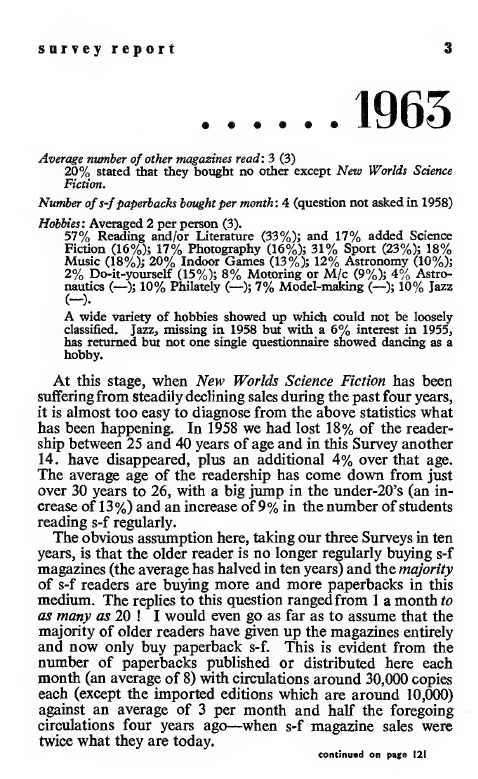
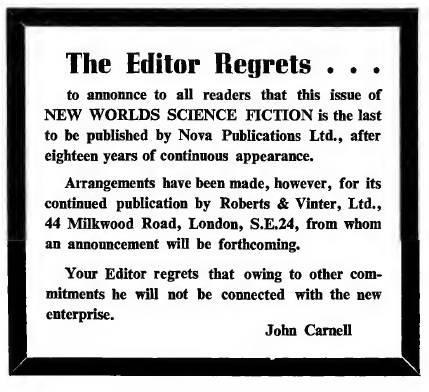
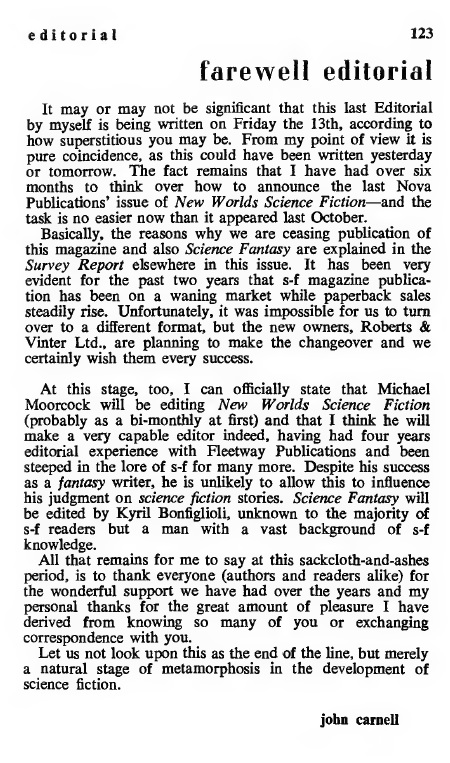
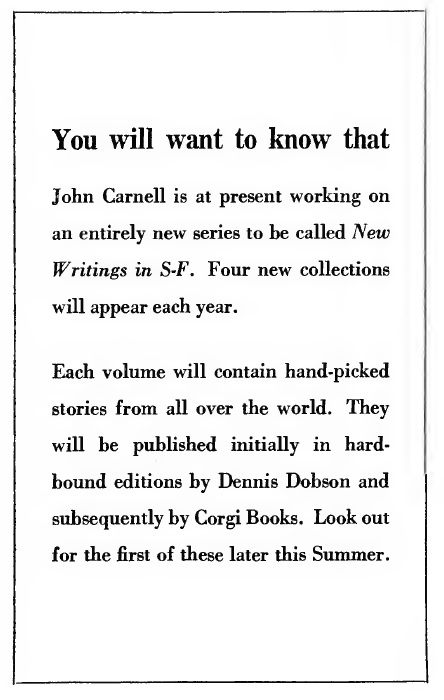
![[February 27, 1964] Beatles, Boredom and Ballard ( <i>New Worlds, March 1964</i>)](https://i0.wp.com/galacticjourney.org/wordpress/wp-content/uploads/2019/02/640227cover.jpg?resize=649%2C372)




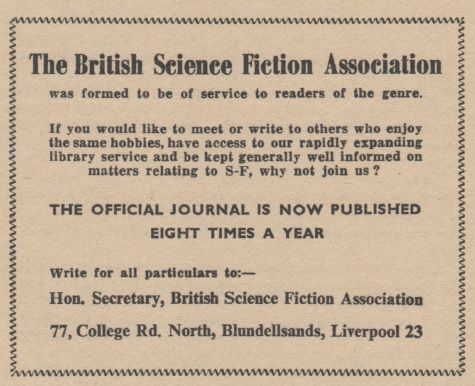


![[February 21, 1964] For the fans (March 1964 <i>Fantasy and Science Fiction</i>)](https://i0.wp.com/galacticjourney.org/wordpress/wp-content/uploads/2019/02/640219cover.jpg?resize=665%2C372)


![[September 23, 1963] Small Comforts (October 1963 <i>Fantastic</i>)](https://i0.wp.com/galacticjourney.org/wordpress/wp-content/uploads/2018/09/630923cover.jpg?resize=541%2C372)























































